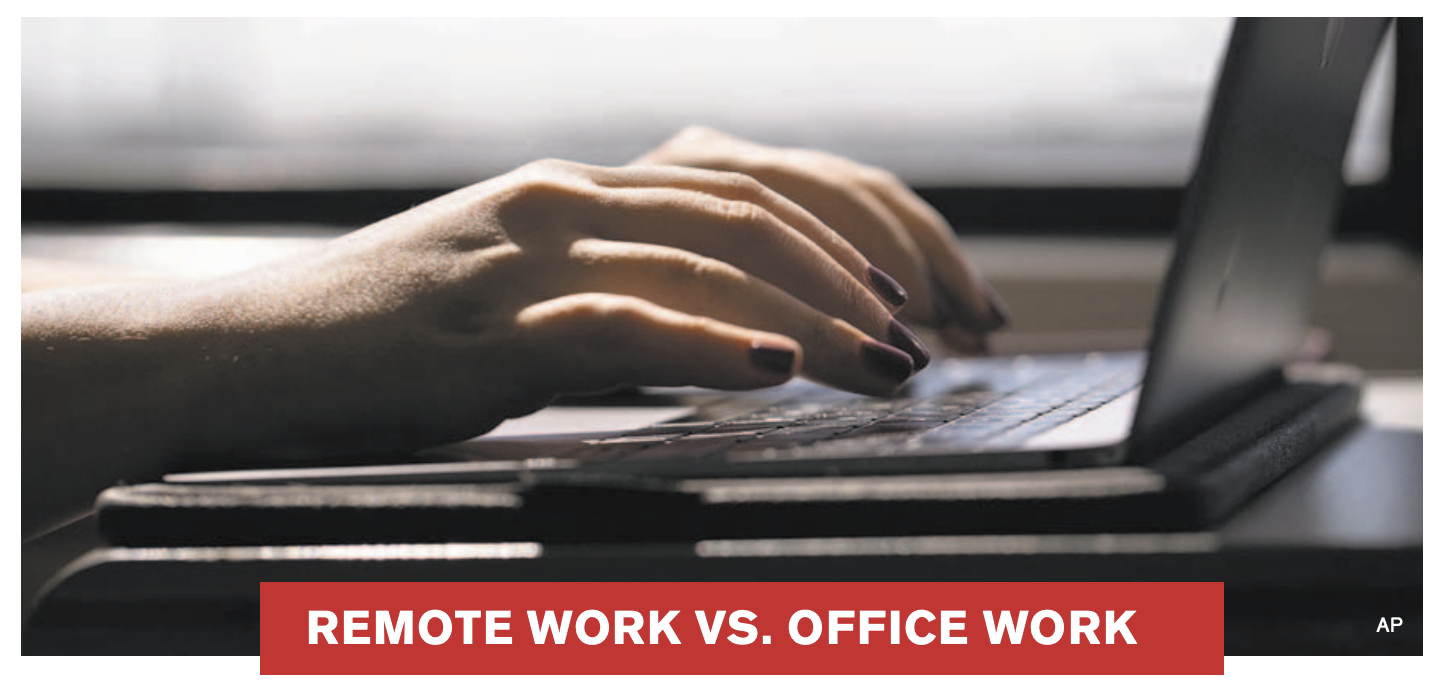
The following editorial was originally published in the Honolulu Star-Advertiser on Sunday, December 4, 2022 as part of the "Raise Your Hand" column in the Insights section.

Out of the office is the new ‘in’
By: Kimberly Murphy, Waipahu High School, c/o 2023 (left)
The pandemic has come to a slowdown and regulations are ending, creating a hard push back into pre-pandemic life. With the world returning back to “normalcy,” employers requiring employees to return to the office has become a point of contention.
As a student who will be joining the workforce in the near future, I believe that employees should still be allowed to continue to work from home. Times have changed and employees and employers have adapted to a work-from-home environment. Technology has opened up the possibility of working full-time at home.
Thanks to innovations in technology, functional work environments no longer require people to go to the office in person. During the summer of 2022, I participated in an internship program with HawaiiUSA. On my first day, I noticed that the office was emptier than I expected due to many employees working from home. As interns, we were introduced to technologies that make office life productive, such as virtual calendars, online meetings and direct messaging.
Based on my experience, I believe that there is no need for people to work face-to-face to have a functional work environment. During my time at HawaiiUSA, I could get detailed instructions from my mentors, like when I was asked to create an informational paper for a mentor who was rarely in the office.
People also enjoy other positives that come with working from home: more flexible schedules, increased family time and reduced commutes. Scott Uyehara, an employee at HawaiiUSA, explained that “the biggest plus is the commute. I spend a total of almost two hours in traffic on most days (working in person) and I don’t lose out on time with family in the afternoon. When work is done, I am already home.”
Being a student who is still planning my future career, the benefits of working from home are very alluring. As a teen without a driver license, my commute to my internship in town from Waipahu would take around an hour-and-a-half.
In order for employees to be able to work from home, employers and employees need to create a functioning system that will facilitate communication and productivity between people working in the office and at home.
— Kimberly Murphy
A quick Google search of “remote jobs near me” will show you just how much working from home has expanded since the pandemic, and proves that most workplaces can survive with people working from home. I believe that a large group of the next generation going into the workforce will choose careers that will allow them to work from home, whether full-time or on a hybrid schedule.
However, people have concerns about how effective remote working is compared to working in person. Because people are not in a professional environment at home, some may take advantage and not produce quality work, wasting time and resources. Moreover, despite the advances in technology, communicating virtually is not always as efficient as talking face to face. For example, some people may miss meetings due to technical difficulties, or they might not check their emails. These issues would lead to miscommunication and the deterioration of a functional work environment.
However, during the pandemic, people have learned their own systems to avoid this. Office workers are adults and are held to a high standard by their employers to uphold their company’s image and to produce quality work. People who do not complete their work face consequences, such as losing privileges and trust. As Uyehara explained: “Working from home is a privilege so it would be taken away, and our work would be closely monitored.”
In order for employees to be able to work from home, employers and employees need to create a functioning system that will facilitate communication and productivity between people working in the office and at home.
It is important to work in person
By: Jonaiya Lorin Caraang, Waipahu High School, c/o 2026 (right)
As the COVID pandemic winds down, many companies are debating between returning to the office and instituting a permanent remote work policy. However, having the ability to work in person boosts productivity and helps those who have been struggling with doing work online.
During the pandemic, many people had difficulty working at home due to the many distractions and difficulty communicating with co-workers. Communicating in person is easier and more effective because it does not require technology. People can talk to their co-workers faster than by sending emails or creating meetings. It is difficult to communicate with groups of people online because there is less accountability and people may avoid messages.
Video conferences or meetings pose their own unique challenges as well. Virtual meetings are filled with interruptions and can often feel like a battle of who can unmute themselves first. At the same time, the ability to mute oneself or turn the video function off means some people feel comfortable sitting in silence without making a meaningful contribution to the discussion. In person, it is easier for people to interact and make their voices heard. Another benefit of working in person is the bonds that can be built with co-workers by interacting face to face. An in-person work environment helps you to connect better with your peers because you can talk one-on-one. You can also get together during breaks as well as before and after work. Talking about work struggles or life problems can help co-workers understand each other better. Not only are there more opportunities to socialize in person, but those interactions feel more natural and authentic than online conversations. Socialization benefits both employees and employers by improving the ability to collaborate.
Working in person improves socialization and communication, and it eliminates distractions.
— Jonaiya Lorin Caraang
Furthermore, being productive at the office is better than working at home because you can do a lot during a full day of in-person work. At the office, they provide you with a personal workspace that is free of the many distractions you may find at home. In the office, there is a culture of mutual accountability and productivity which helps employees get their work done efficiently. When people opt to work at home, they tend to get off track and distracted.
While workers are surrounded by nonstop distractions at home, being at the office allows employees to fully focus on their work. When I was online for school, I was distracted by using my phone and iPad. My baby cousin wanted my attention and needed a playmate. Working in person eliminates distractions by having workers in a separate environment. Working in person helps the worker stay engaged in what they are working on.
As vaccines have become available and COVID cases have decreased, staff members are able to safely return to the office. This is an advantage because now they don’t have to feel isolated and disconnected from the world. Working in person improves socialization and communication, and it eliminates distractions. It is beneficial for both employees and employers to return to work in person now that we can separate our work and home lives.
Related Articles
With its refreshing waters, aromatic scents of native greenery, and crisp breeze, Hawaii is
truly an island paradise. Alongside the locals, you may spot an abundance of tourists — more
than 200,000 of them on the islands on any given day. While tourism is a controversial topic
among locals, its importance to the local community and economy is undeniable.
